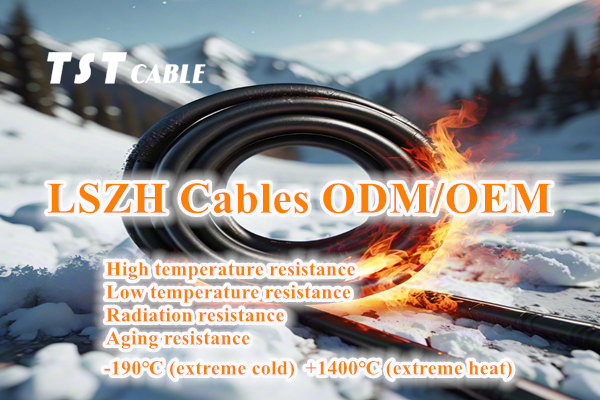In cable manufacturing, core material is one of the most important factors in determining the performance and usage of cables. Different types of core materials have their own unique characteristics to suit different environments and applications.TST CABLES analyzes the following 5 common cable core materials and their characteristics:

1. Copper wire core.
Conductivity: the conductivity of the core material determines the current transmission capacity of the cable. Highly conductive materials such as copper and aluminum can effectively reduce the resistance loss of the cable, improve the efficiency of current transmission. Therefore, copper and aluminum and other metal materials are often used as cable core to meet the needs of different current loads.
- Aluminum wire core.
Characteristics: Aluminum wire core has a lower cost compared to copper wire core, but the conductivity is slightly inferior to copper. It is lightweight, flexible and suitable for low and medium voltage power transmission.
Advantages: low cost, lightweight.
Disadvantages: slightly less conductive, easy to produce corrosion.
- Aluminum alloy wire core.
Characteristics: Aluminum alloy wire core is aluminum and other metals alloyed into a better conductivity and mechanical strength, more corrosion-resistant than pure aluminum wire core, more suitable for use in harsh environments.
Advantages: good electrical conductivity, excellent mechanical properties, corrosion resistance.
Disadvantages: higher cost.
- Copper clad aluminum wire core.
Characteristics: copper-clad aluminum core is an aluminum core coated with a layer of copper and become, both copper and aluminum advantages, with good electrical conductivity and mechanical strength, while reducing costs.
Advantages: good electrical conductivity, high mechanical strength, relatively low cost.
Disadvantages: in a particular environment may occur galvanic corrosion.
- Tinned copper wire core.
Characteristics: tinned copper wire core is the surface of the copper core coated with a layer of tin, improve its corrosion resistance and oxidation resistance, suitable for humid and corrosive environments.
Advantages: good corrosion resistance, oxidation resistance.
Disadvantages: Higher cost.
What is the impact of the cable core material on the performance of the cable?
- Conductivity: the conductivity of the core material determines the current transmission capacity of the cable. Highly conductive materials such as copper and aluminum can effectively reduce the resistance loss of the cable, improve the efficiency of current transmission. Therefore, copper and aluminum and other metal materials are often used as cable core to meet the needs of different current loads.
- Mechanical properties: the mechanical properties of the core material, such as tensile strength, bending resistance and fatigue resistance, determines the applicability of the cable in different environments and conditions of use. For example, aluminum conductor cable has a higher tensile strength and better corrosion resistance, suitable for spanning and overhead line laying.
- Thermal performance: the thermal performance of the core material affects the stability of the cable’s operation in a high-temperature environment. Copper conductor in a high-temperature environment is prone to lose its conductive properties, while some special alloys or composite materials have better high-temperature performance, suitable for high-temperature environment.
- Installation and operation: the physical properties of the core material also affect the installation and operation of the cable. For example, copper wire connection is easy to operate, while the aluminum core connection is more difficult, and the operation of the joints are prone to contact resistance increases and heat. In addition, copper for some cable materials such as mineral oil, rosin composite impregnants have accelerated aging effect, need to take special measures such as surface tinning to reduce the aging rate.
The core material of the cable has an important impact on the conductive properties, mechanical properties, thermal properties, as well as the installation and operation of the cable.TST CABLES reminds consumers to choose the core material of the cable, you need to take into account the cable’s use of the environment, the current load, the cost of the cable, and other factors, in order to ensure that the performance and stable operation of the cable.
Also available in:
English


